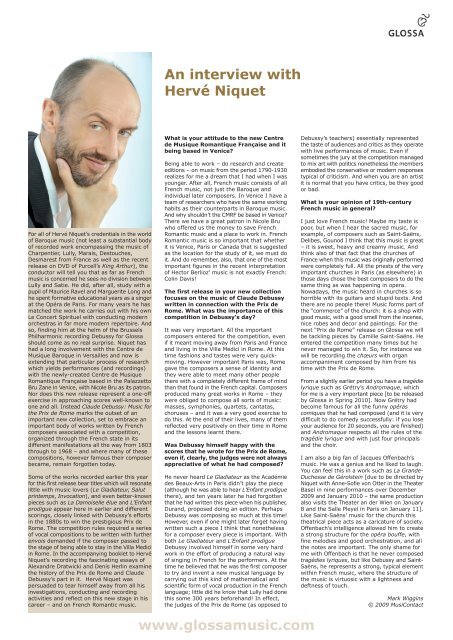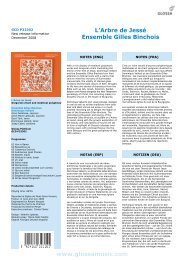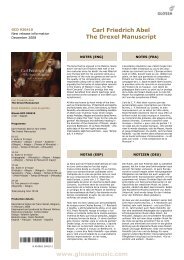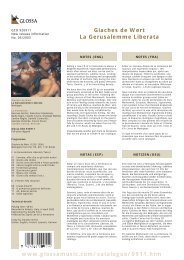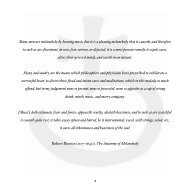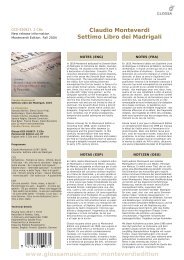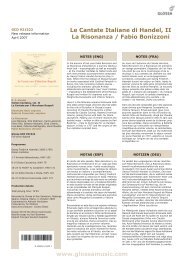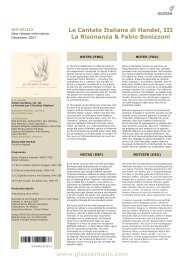Commercial release sheet (PDF) - Glossa Music
Commercial release sheet (PDF) - Glossa Music
Commercial release sheet (PDF) - Glossa Music
You also want an ePaper? Increase the reach of your titles
YUMPU automatically turns print PDFs into web optimized ePapers that Google loves.
For all of Hervé Niquet’s credentials in the world<br />
of Baroque music (not least a substantial body<br />
of recorded work encompassing the music of<br />
Charpentier, Lully, Marais, Destouches,<br />
Desmarest from France as well as the recent<br />
<strong>release</strong> on DVD of Purcell’s King Arthur), the<br />
conductor will tell you that as far as French<br />
music is concerned he sees no division between<br />
Lully and Satie. He did, after all, study with a<br />
pupil of Maurice Ravel and Marguerite Long and<br />
he spent formative educational years as a singer<br />
at the Opéra de Paris. For many years he has<br />
matched the work he carries out with his own<br />
Le Concert Spirituel with conducting modern<br />
orchestras in far more modern repertoire. And<br />
so, finding him at the helm of the Brussels<br />
Philharmonic recording Debussy for <strong>Glossa</strong><br />
should come as no real surprise. Niquet has<br />
had a long involvement with the Centre de<br />
Musique Baroque in Versailles and now is<br />
extending that particular process of research<br />
which yields performances (and recordings)<br />
with the newly-created Centre de Musique<br />
Romantique Française based in the Palazzetto<br />
Bru Zane in Venice, with Nicole Bru as its patron.<br />
Nor does this new <strong>release</strong> represent a one-off<br />
exercise in approaching scores well-known to<br />
one and all. Instead Claude Debussy: <strong>Music</strong> for<br />
the Prix de Rome marks the outset of an<br />
important new collection, set to embrace an<br />
important body of works written by French<br />
composers associated with a competition,<br />
organized through the French state in its<br />
different manifestations all the way from 1803<br />
through to 1968 – and where many of these<br />
compositions, however famous their composer<br />
became, remain forgotten today.<br />
Some of the works recorded earlier this year<br />
for this first <strong>release</strong> bear titles which will resonate<br />
little with music lovers (Le Gladiateur, Salut<br />
printemps, Invocation), and even better-known<br />
pieces such as La Damoiselle élue and L’Enfant<br />
prodigue appear here in earlier and different<br />
scorings, closely linked with Debussy’s efforts<br />
in the 1880s to win the prestigious Prix de<br />
Rome. The competition rules required a series<br />
of vocal compositions to be written with further<br />
envois demanded if the composer passed to<br />
the stage of being able to stay in the Villa Medici<br />
in Rome. In the accompanying booklet to Hervé<br />
Niquet’s recording the fascinating essays of<br />
Alexandre Dratwicki and Denis Herlin examine<br />
the history of the Prix de Rome and Claude<br />
Debussy’s part in it. Hervé Niquet was<br />
persuaded to tear himself away from all his<br />
investigations, conducting and recording<br />
activities and reflect on this new stage in his<br />
career – and on French Romantic music.<br />
An interview with<br />
Hervé Niquet<br />
What is your attitude to the new Centre<br />
de Musique Romantique Française and it<br />
being based in Venice?<br />
Being able to work – do research and create<br />
editions – on music from the period 1790-1930<br />
realizes for me a dream that I had when I was<br />
younger. After all, French music consists of all<br />
French music, not just the Baroque and<br />
individual later composers. In Venice I have a<br />
team of researchers who have the same working<br />
habits as their counterparts in Baroque music.<br />
And why shouldn’t the CMRF be based in Venice?<br />
There we have a great patron in Nicole Bru<br />
who offered us the money to save French<br />
Romantic music and a place to work in. French<br />
Romantic music is so important that whether<br />
it is Venice, Paris or Canada that is suggested<br />
as the location for the study of it, we must do<br />
it. And do remember, also, that one of the most<br />
important figures in the recent interpretation<br />
of Hector Berlioz’ music is not exactly French:<br />
Colin Davis!<br />
The first <strong>release</strong> in your new collection<br />
focuses on the music of Claude Debussy<br />
written in connection with the Prix de<br />
Rome. What was the importance of this<br />
competition in Debussy’s day?<br />
It was very important. All the important<br />
composers entered for the competition, even<br />
if it meant moving away from Paris and France<br />
and living in the Villa Medici in Rome. At this<br />
time fashions and tastes were very quickmoving.<br />
However important Paris was, Rome<br />
gave the composers a sense of identity and<br />
they were able to meet many other people<br />
there with a completely different frame of mind<br />
than that found in the French capital. Composers<br />
produced many great works in Rome – they<br />
were obliged to compose all sorts of music:<br />
masses, symphonies, quartets, cantatas,<br />
choruses – and it was a very good exercise to<br />
do this. At the end of their lives, many of them<br />
reflected very positively on their time in Rome<br />
and the lessons learnt there.<br />
Was Debussy himself happy with the<br />
scores that he wrote for the Prix de Rome,<br />
even if, clearly, the judges were not always<br />
appreciative of what he had composed?<br />
He never heard Le Gladiateur as the Académie<br />
des Beaux-Arts in Paris didn’t play the piece<br />
(although he was able to hear L’Enfant prodigue<br />
there), and ten years later he had forgotten<br />
that he had written this piece when his publisher,<br />
Durand, proposed doing an edition. Perhaps<br />
Debussy was composing so much at this time!<br />
However, even if one might later forget having<br />
written such a piece I think that nonetheless<br />
for a composer every piece is important. With<br />
both Le Gladiateur and L’Enfant prodigue<br />
Debussy involved himself in some very hard<br />
work in the effort of producing a natural way<br />
of singing in French for the performers. At the<br />
time he believed that he was the first composer<br />
to try and invent a new musical language by<br />
carrying out this kind of mathematical and<br />
scientific form of vocal production in the French<br />
language; little did he know that Lully had done<br />
this some 300 years beforehand! In effect,<br />
the judges of the Prix de Rome (as opposed to<br />
www.glossamusic.com<br />
Debussy’s teachers) essentially represented<br />
the taste of audiences and critics as they operate<br />
with live performances of music. Even if<br />
sometimes the jury at the competition managed<br />
to mix art with politics nonetheless the members<br />
embodied the conservative or modern responses<br />
typical of criticism. And when you are an artist<br />
it is normal that you have critics, be they good<br />
or bad.<br />
What is your opinion of 19th-century<br />
French music in general?<br />
I just love French music! Maybe my taste is<br />
poor, but when I hear the sacred music, for<br />
example, of composers such as Saint-Saëns,<br />
Delibes, Gounod I think that this music is great<br />
– it is sweet, heavy and creamy music. And<br />
think also of that fact that the churches of<br />
France when this music was originally performed<br />
were completely full. All the priests of the very<br />
important churches in Paris (as elsewhere) in<br />
those days chose the best composers to do the<br />
same thing as was happening in opera.<br />
Nowadays, the music heard in churches is so<br />
horrible with its guitars and stupid texts. And<br />
there are no people there! <strong>Music</strong> forms part of<br />
the “commerce” of the church: it is a shop with<br />
good music, with a good smell from the incense,<br />
nice robes and decor and paintings. For the<br />
next “Prix de Rome” <strong>release</strong> on <strong>Glossa</strong> we will<br />
be tackling pieces by Camille Saint-Saëns. He<br />
entered the competition many times but he<br />
never managed to win it. So, for instance we<br />
will be recording the chœurs with organ<br />
accompaniment composed by him from his<br />
time with the Prix de Rome.<br />
From a slightly earlier period you have a tragédie<br />
lyrique such as Grétry’s Andromaque, which<br />
for me is a very important piece [to be <strong>release</strong>d<br />
by <strong>Glossa</strong> in Spring 2010]. Now Grétry had<br />
become famous for all the funny opéras<br />
comiques that he had composed (and it is very<br />
difficult to do comedy successfully: if you lose<br />
your audience for 20 seconds, you are finished)<br />
and Andromaque respects all the rules of the<br />
tragédie lyrique and with just four principals<br />
and the choir.<br />
I am also a big fan of Jacques Offenbach’s<br />
music. He was a genius and he liked to laugh.<br />
You can feel this in a work such as La Grande-<br />
Duchesse de Gérolstein [due to be directed by<br />
Niquet with Anne-Sofie von Otter in the Theater<br />
Basel in nine performances over December<br />
2009 and January 2010 – the same production<br />
also visits the Theater an der Wien on January<br />
8 and the Salle Pleyel in Paris on January 11].<br />
Like Saint-Saëns’ music for the church this<br />
theatrical piece acts as a caricature of society.<br />
Offenbach’s intelligence allowed him to create<br />
a strong structure for the opéra bouffe, with<br />
fine melodies and good orchestration, and all<br />
the notes are important. The only shame for<br />
me with Offenbach is that he never composed<br />
tragédies lyriques, but like Debussy and Saint-<br />
Saëns, he represents a strong, typical element<br />
within French music, where the structure of<br />
the music is virtuosic with a lightness and<br />
deftness of touch.<br />
Mark Wiggins<br />
© 2009 MusiContact


